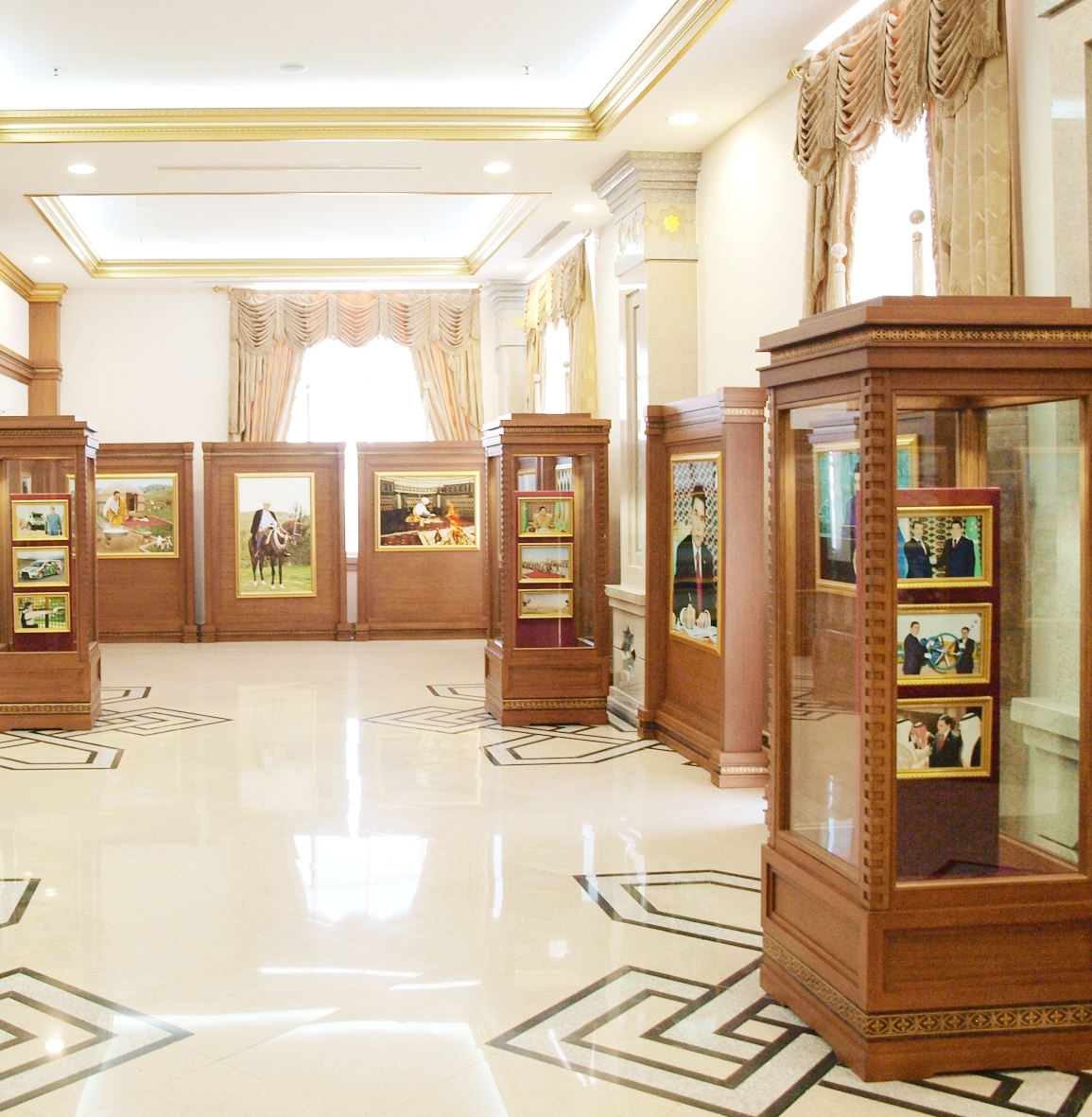Hall of Independence
 In the Hall of Independence, a diverse array of
exhibits, including photographs, documents, and books, vividly illustrates Turkmenistan's achievements in key
sectors such as education, science, healthcare, and culture. It also highlights the efforts to strengthen the
country's domestic and foreign policies, as well as the development of industry and the economy.
Turkmenistan spans an area of 491,210 square kilometers. Its territory extends 1,100 kilometers from west to
east and 650 kilometers from north to south. The country shares borders with Kazakhstan to the north,
Uzbekistan to the northeast and east, Afghanistan to the southeast, and Iran to the south. In the west,
Turkmenistan has a natural boundary with Azerbaijan, defined by the Caspian Sea.
The exhibition features a unique hand-woven carpet depicting the map of Turkmenistan. This artistic piece
covers an area of 20 square meters. Turkmenistan is divided into five provinces: Akhal, Balkan, Dashoguz,
Lebap, and Mary, each further divided into districts.
The Mary province, with Mary city as its administrative center, is one of Turkmenistan's five regions. Its
industry demonstrates steady growth, with key sectors including gas extraction, electricity generation,
mechanical engineering and metalworking, cotton processing, mineral fertilizer production, and the food and
textile industries.
The Mary province also achieves considerable success in agriculture and animal husbandry, cultivating cotton,
grain, vegetables, melons, fruits, grapes, and sugar beets.
The gas extraction industry plays a pivotal role in the country's economy. Turkmenistan's largest natural gas
deposits are located in Yolotan, Shatlyk, and Uchadzhi, where modern industrial complexes have been
established.
The Mary province is the country's leading electricity producer. The Mary State Power Plant's capacity ensures
substantial electricity supply for both residential and industrial needs. The Mary Urea Plant and the Maryazot
production association also significantly contribute to the country's increasing production capacity.
Farmers in the Mary province make a substantial contribution to the region's development by producing high
yields of grain, cotton, horticultural products, and sugar beets. The region takes pride in its sugar factory,
the first in Turkmenistan to produce sugar.
In addition to national economic and production facilities, the region is systematically developing
residential and cultural sites, schools, kindergartens, cultural and healthcare centers, apartment buildings,
parks, and other amenities. Thanks to the efforts of the President of Turkmenistan, modern settlements and
villages are being built across the region.
The Mary province is home to hundreds of general education schools, vocational and pedagogical colleges, music
and medical schools, the State Energy Institute, children's music and art schools, libraries, and cultural
centers. The new buildings of the Kemin Drama Theater, the historical and local history museum, and the Mary
Regional Library enhance the city of Mary's urban landscape. The State Historical and Cultural Reserve
"Ancient Merv" is a popular destination for international tourists and travelers. This reserve is designated
as a UNESCO World Heritage Site."
In the Hall of Independence, a diverse array of
exhibits, including photographs, documents, and books, vividly illustrates Turkmenistan's achievements in key
sectors such as education, science, healthcare, and culture. It also highlights the efforts to strengthen the
country's domestic and foreign policies, as well as the development of industry and the economy.
Turkmenistan spans an area of 491,210 square kilometers. Its territory extends 1,100 kilometers from west to
east and 650 kilometers from north to south. The country shares borders with Kazakhstan to the north,
Uzbekistan to the northeast and east, Afghanistan to the southeast, and Iran to the south. In the west,
Turkmenistan has a natural boundary with Azerbaijan, defined by the Caspian Sea.
The exhibition features a unique hand-woven carpet depicting the map of Turkmenistan. This artistic piece
covers an area of 20 square meters. Turkmenistan is divided into five provinces: Akhal, Balkan, Dashoguz,
Lebap, and Mary, each further divided into districts.
The Mary province, with Mary city as its administrative center, is one of Turkmenistan's five regions. Its
industry demonstrates steady growth, with key sectors including gas extraction, electricity generation,
mechanical engineering and metalworking, cotton processing, mineral fertilizer production, and the food and
textile industries.
The Mary province also achieves considerable success in agriculture and animal husbandry, cultivating cotton,
grain, vegetables, melons, fruits, grapes, and sugar beets.
The gas extraction industry plays a pivotal role in the country's economy. Turkmenistan's largest natural gas
deposits are located in Yolotan, Shatlyk, and Uchadzhi, where modern industrial complexes have been
established.
The Mary province is the country's leading electricity producer. The Mary State Power Plant's capacity ensures
substantial electricity supply for both residential and industrial needs. The Mary Urea Plant and the Maryazot
production association also significantly contribute to the country's increasing production capacity.
Farmers in the Mary province make a substantial contribution to the region's development by producing high
yields of grain, cotton, horticultural products, and sugar beets. The region takes pride in its sugar factory,
the first in Turkmenistan to produce sugar.
In addition to national economic and production facilities, the region is systematically developing
residential and cultural sites, schools, kindergartens, cultural and healthcare centers, apartment buildings,
parks, and other amenities. Thanks to the efforts of the President of Turkmenistan, modern settlements and
villages are being built across the region.
The Mary province is home to hundreds of general education schools, vocational and pedagogical colleges, music
and medical schools, the State Energy Institute, children's music and art schools, libraries, and cultural
centers. The new buildings of the Kemin Drama Theater, the historical and local history museum, and the Mary
Regional Library enhance the city of Mary's urban landscape. The State Historical and Cultural Reserve
"Ancient Merv" is a popular destination for international tourists and travelers. This reserve is designated
as a UNESCO World Heritage Site."



